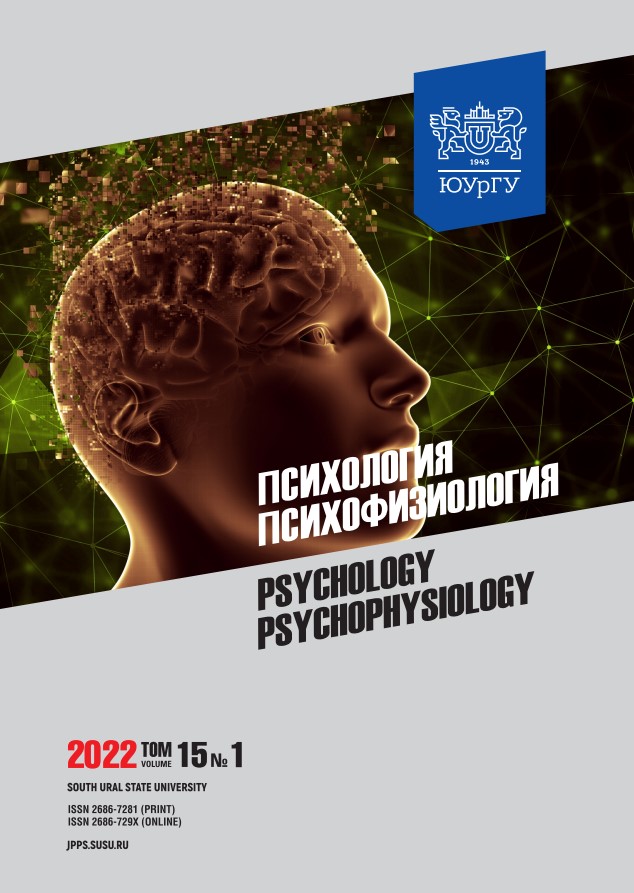Dynamics of psychological characteristics in coronary heart disease patients after psychological intervention during inpatient rehabilitation after coronary artery bypass grafting
Abstract
Introduction. The prevalence of coronary heart disease (CHD) and its death rate remain high. Various rehabilitation methods, including psychological ones, are used for patients with CHD who require surgery. Psychological intervention in cardiology can be improved through the study of psychological characteristics and their dynamics in CHD patients. Aim. The paper aims to compare and identify the dynamics of psychoemotional characteristics (including anxiety, asthenia, and psychopathological symptoms) in CHD patients who participated in a psychological intervention program after CABG (experimental group) and CHD patients who did not participate in the program in the postoperative period (control group). Materials and methods. The study involved 46 patients (n = 21, experimental group; n = 25, control group; mean age – 59.59 ± 1.28 years). Psychological intervention was based on cognitive-behavioral methods. Before CABG and three months after surgery, patients were tested with the following methods: Asthenic State Scale, Integrative Anxiety Test, Symptom Checklist-90-R (SCL-90-R), and Big Five Personality Test. Results show that three months after CABG asthenia decreased in both groups. In the experimental group, a decrease in anxiety and its structural components (“Emotional discomfort”, “Phobic component”, “Anxious perception of the future”) was recorded, and a positive tendency was observed for the majority of indicators of psychopathological symptoms, including “somatization”, “interpersonal sensitivity”, “depression”, and “phobic anxiety”. According to the results of the present research, all patients on average had low rates of the “Agreeableness” scale and below the average rates of the “Conscientiousness” scale in their personality structure. Moreover, the examined patients had an above average level of the “Extraversion” scale. Conclusion. Psychological intervention with cognitive-behavioral methods is strongly recommended to be included in the comprehensive cardiac rehabilitation program.
Downloads
References
2. Neumann F.J., Sousa-Uva M., Ahlsson A. et al. 2018 ESC/EACTS Guidelines on myocardial revascularization. European Heart Journal. 2019;40(2):87–165. DOI: https://doi.org/10.1093/ eurheartj/ehy394
3. AbuRuz M.E. Pre-operative depression predicted longer hospital length of stay among patients undergoing coronary artery bypass graft surgery. Risk management and healthcare policy. 2019(12):75–83.
4. Poole L., Ronaldson A., Kidd T. et al. Pre-surgical depression and anxiety and recovery following coronary artery bypass graft surgery. Behavioral medicine. 2017;40(2):249–258. DOI: https://doi.org/10.1007/s10865-016-9775-1
5. Prado-Olivares J., Chover-Sierra E. Preoperatory Anxiety in Patients Undergoing Cardiac Surgery. Diseases. 2019;7(2):46. DOI: https://doi.org/10.3390/diseases7020046
6. Kubareva M.I., Ibatov A.D. Psychosocial factors and coronary heart disease. Terapevticheskii Arkhiv = Therapeutic Archive. 2019;91(12):70–74. (in Russ.). DOI: https://doi.org/ 10.26442/00403660.2019.12.000086
7. Belialov F.I. Depression, anxiety, and stress in patients with coronary heart disease. Terapevticheskii Arkhiv = Therapeutic Archive. 2017;89(8):104–109. (in Russ.). DOI: 10.17116/terarkh2017898104-109
8. Garganeeva N.P., Kornetov N.A., Belokrylova M.F. Psychosocial factors, anxiety and depressive disorders in patients with coronary artery disease: problems of comorbidity and prognosis. Rossiyskiy kardiologicheskiy zhurnal = Russian Journal of Cardiology. 2020;25(9):26–32. (in Russ.). DOI: https://doi.org/10.15829/1560-4071-2020-4040
9. Cohen B.E., Edmondson D., Kronish I.M. State of the Art Review: Depression, Stress, Anxiety, and Cardiovascular Disease. American journal of hypertension. 2015;28(11):1295–1302. DOI: https://doi.org/10.1093/ajh/hpv047
10. Kupper N., Denollet J. Type D Personality as a Risk Factor in Coronary Heart Disease: a Review of Current Evidence. Current cardiology reports. 2018;20(11):104. DOI: https://doi.org/ 10.1007/s11886-018-1048-x
11. Sahoo S., Padhy S.K., Padhee B. et al. Role of personality in cardiovascular diseases: An issue that needs to be focused too! Indian heart journal. 2018;70(3):S471–S477. DOI: https://doi.org/10.1016/j.ihj.2018.11.003
12. Piepoli M.F., Hoes A.W., Agewall S. et al. 2016 European Guidelines on cardiovascular disease prevention in clinical practice: The Sixth Joint Task Force of the European Society of Cardiology and Other Societies on Cardiovascular Disease Prevention in Clinical Practice (constituted by representatives of 10 societies and by invited experts) Developed with the special contribution of the European Association for Cardiovascular Prevention & Rehabilitation (EACPR). Atherosclerosis. 2016(252):207–274. DOI: https://doi.org/10.1016/j.atherosclerosis.2016.05.037
13. Price K.J., Gordon B.A., Bird S.R., Benson A.C. A review of guidelines for cardiac rehabilitation exercise programmes: Is there an international consensus? European journal of preventive cardiology. 2016;23(16):1715–1733. DOI: https://doi.org/10.1177/2047487316657669
14. Nikolaev E.L., Lazareva E.Yu. Psychotherapy and psychological intervention for patients with cardiovascular diseases. Vestnik psikhiatrii i psikhologii Chuvashii = The Bulletin of Chuvash Psychiatry and Psychology. 2015;11(1):57–76. (in Russ.).
15. McPhillips R., Salmon P., Wells A., Fisher P. Cardiac Rehabilitation Patients Accounts of Their Emotional Distress and Psychological Needs: A Qualitative Study. Journal of the American Heart Association. 2019;8(11):e011117. DOI: https://doi.org/10.1161/JAHA.118.011117
16. Bek Dzh. Kognitivno-povedencheskaya terapiya [Cognitive-behavioral therapy]. St. Petersburg, Piter Publ. 2018:416 (in Russ.).
17. Dao T.K., Youssef N.A., Armsworth M. et al. Randomized controlled trial of brief cognitive behavioral intervention for depression and anxiety symptoms preoperatively in patients undergoing coronary artery bypass graft surgery. The Journal of Thoracic and Cardiovascular Surgery. 2011;142(3):e109–e115. DOI: https://doi.org/10.1016/j.jtcvs.2011.02.046
18. Barnason S., Zimmerman L., Nieveen J. et al. Relationships between fatigue and early postoperative recovery outcomes over time in elderly patients undergoing coronary artery bypass graft surgery. Heart and lung: the journal of critical care. 2008;37(4):245–256. DOI: https://doi.org/10.1016/j.hrtlng.2007.09.003
19. Reavell J., Hopkinson M., Clarkesmith D., Lane D.A. Effectiveness of Cognitive Behavioral Therapy for Depression and Anxiety in Patients With Cardiovascular Disease: A Systematic Review and Meta-Analysis. Psychosomatic medicine. 2018;80(8):742–753. DOI: https://doi.org/10.1097/ PSY.0000000000000626
20. Zhitkova R.S., Khaliullina D.R., Akhmetshina L.A., Sharipova R.R. The importance of cardio rehabilitation combined with psychological correction in post myocardial infarction patients. Vestnik Sovremennoi Klinicheskoi Mediciny = The Bulletin of Contemporary Clinical Medicine. 2020;13(3):47–51. (in Russ.).
References on translit
-Copyright (c) 2022 Psychology. Psychophysiology

This work is licensed under a Creative Commons Attribution-NonCommercial-NoDerivatives 4.0 International License.



